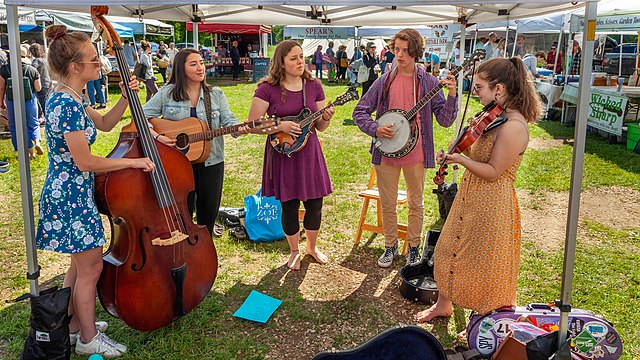The term American folk music encompasses numerous music genres, variously known as traditional music, traditional folk music, contemporary folk music, vernacular music, or roots music. Many traditional songs have been sung within the same family or folk group for generations, and sometimes trace back to such origins as the British Isles, Mainland Europe, or Africa. Musician Mike Seeger once famously commented that the definition of American folk music is "...all the music that fits between the cracks."
Singer-songwriter Woody Guthrie emerged from the dust bowl of Oklahoma and the Great Depression in the mid-20th Century, with lyrics that embraced his views on ecology, poverty, and unionization in the United States., paired with melody reflecting the many genres of American folk music.
Bluegrass music is a genre of American roots music that developed in the 1940s in the Appalachian region of the United States. The genre derives its name from the band Bill Monroe and the Blue Grass Boys. Like mainstream country music, it largely developed out of old-time string music, though in contrast, it is traditionally played exclusively on acoustic instruments and also has roots in traditional English, Scottish and Irish ballads and dance tunes, as well as in blues and jazz. It was further developed by musicians who played with Monroe, including 5-string banjo player Earl Scruggs and guitarist Lester Flatt. Monroe characterized the genre as "Scottish bagpipes and ole-time fiddlin'. It's a part of Methodist, Holiness and Baptist traditions. It's blues and jazz, and it has a high lonesome sound."
A bluegrass band
A 5-string banjo
Bluegrass artists use a variety of stringed instruments.
Ralph Stanley on April 20, 2008, in Dallas, Texas





